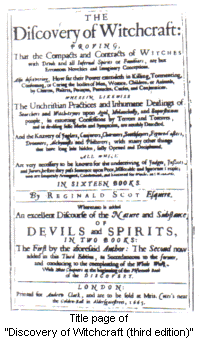|
|
 |
|
Page: 3
At Smeeth, a village in the county of Kent, England, there lived one Reginald Scot, a gentleman hop farmer, who not only did much to improve the quality of the hop, but also performed his duties as justice of the peace. One day, before him, at the magistrates court at Rochester, there appeared a young girl named Margaret Simons, charged with withcraft. Scot was struck by the cruelty of the prosecution and determined to devote himself to demonstrating the foolishness of popular superstitions about witchcraft and the wonders accomplished seemingly by diabolic influence. For this purpose he set himself the task of understanding a knowledge of the tricks used by entertainers of the day, and in one, a Frenchman named Cautares, he found an excellent teacher. With the knowledge gained of many feats, which, when performed before ignorant people, supernatural means could be the explanation, he put pen to paper and in 1584 his monumental work, The Discoverie of Witchcraft was published in London. Within the 560 pages of the first edition, one chapter, The Art of Juggling Discovered, deals with the conjuring tricks of the time, and it is of interest to find that the principles used to bring about the effects of those times are still used in contemporary tricks.
 With the passing of the Tudors, there came to England the first of the Stuarts, James the Sixth of Scotland, and the First of England, a man who was fanatical about witches and withcraft. To him, Scot's book was anathema and all copies were ordered to be burned. Most fortunately for students of conjuring and even more so for collectors of antiquarian books many escapted the bonfire and in recent years a fair copy of the first edition has been sold for £6,400*
With the passing of the Tudors, there came to England the first of the Stuarts, James the Sixth of Scotland, and the First of England, a man who was fanatical about witches and withcraft. To him, Scot's book was anathema and all copies were ordered to be burned. Most fortunately for students of conjuring and even more so for collectors of antiquarian books many escapted the bonfire and in recent years a fair copy of the first edition has been sold for £6,400*
The coming of the seventeenth century in Europe in particular, saw little change in the methods used by the jugglers and conjurers. In Germany and Holland one heras of Pottage and Ockes Bockes (Hocus Pocus), and in respect of the term Hocus Pocus there seems evidence to show that in the early part of that century, and English conjurer used that name.
*About $15,000 Canadian dollars as of Feb. 17th 2005.
Page:
1 2 3 4 5 6 7 8 9 10 11
<--Prev Page Next Page-->
Back to the Articles Directory
|
 |
|

